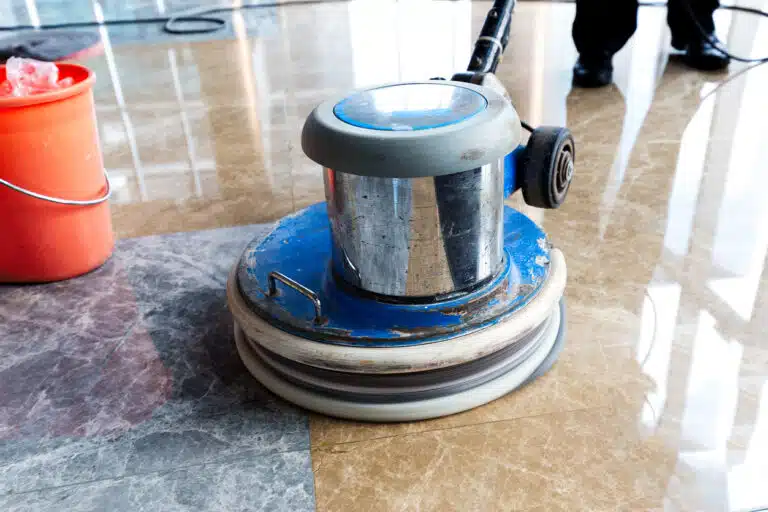When it comes to maintaining the cleanliness and upkeep of commercial spaces, floor care plays a crucial role. From regular sweeping and mopping to deep cleaning, stripping, and waxing, ensuring floors remain in top condition is essential to presenting a professional and welcoming environment.
However, the method of paying for floor care services can vary depending on the business’s needs and the facilities management model. Here are a few pros and cons of two common approaches to floorcare: including it in the overall janitorial program pricing versus paying each time a floorcare job is done/needed.
1. Including Floor Care in the Facilities Janitorial Program Pricing
Many facilities opt to include floorcare services as part of their ongoing janitorial program. This means that floorcare is bundled into the overall price, and the facility management company performs regular cleaning and maintenance as a routine part of the service.
Pros
- Predictable Costs: One of the primary benefits of including floorcare in the janitorial program is the predictability of costs. Facilities know exactly what they will be paying each month without surprises. This is ideal for businesses with set budgets or those looking to avoid unexpected expenses.
- Routine Maintenance: Having floorcare included ensures that floors are maintained regularly. This can lead to a longer lifespan for the flooring, as regular upkeep (such as stripping and waxing) prevents damage from dirt, grime, or wear and tear.
- Convenience: Facilities can benefit from knowing that all their cleaning and floorcare needs are managed in one go. There is no need to worry about scheduling or tracking individual tasks. This can save time and reduce administrative burdens.
- Better Hygiene and Appearance: Regular floorcare often includes cleaning, polishing, and maintaining surfaces, which can enhance the overall cleanliness and appearance of the facility. A well-maintained floor provides a clean, safe, and professional environment for employees, clients, and visitors.
- Long-Term Cost Savings: Over time, bundling floorcare into your janitorial program can be more cost-effective. By maintaining floors regularly, you may avoid costly repairs or replacements that arise from neglecting floor maintenance. This also means that equipment is kept on site and there are no extra costs like travel.
Cons
- Overpaying for Infrequent Services: If your facility does not need frequent floorcare (such as waxing or deep cleaning), you might end up overpaying for services that are not necessary. This can be especially problematic for smaller facilities or those with less foot traffic.
- Lack of Customization: When floorcare is bundled into the overall janitorial pricing, you may have less flexibility to tailor services to your specific needs. For example, if your floors only need occasional care or if you prefer certain types of products or services, it may be harder to adjust the package.
- Potential for Underperformance: Since floorcare is part of a larger contract, the janitorial service provider may not prioritize it as much as more frequent cleaning tasks. This could lead to issues with quality if the provider’s attention is divided.
2. Paying for Each Floor Care Job as Needed
Another approach is to pay for floorcare services on a per-job basis. This means that instead of bundling it into your janitorial program, you would request floorcare services when needed and pay for them individually.
Pros
- Cost Control: Paying per job allows you to control how much you spend on floorcare, as you only pay when the service is needed. This can be a great option for businesses with less frequent floorcare needs or those that want to minimize costs.
- Customization and Flexibility: With per-job payments, you can choose exactly when and what kind of floorcare is required. If you only need deep cleaning or waxing a couple of times a year, you can opt for those services without paying for a recurring floorcare package.
- Focus on Specific Needs: You can tailor the floorcare services to your exact needs. If certain areas of the facility require more attention, you can schedule specialized care without affecting other parts of the building.
Cons
- Unpredictable Costs: While the flexibility of paying per job is appealing, it can lead to unpredictable costs. You may need floorcare services more often than anticipated, leading to unexpected bills. Additionally, if there are urgent floorcare needs (like spills or stains), the cost could be higher than expected.
- Potential for Gaps in Maintenance: If you only pay for floorcare services on an as-needed basis, your floors may not receive the consistent maintenance they require. This can lead to quicker deterioration of the flooring, especially in high-traffic areas, resulting in higher repair or replacement costs overall.
- Administrative Hassle: Coordinating individual floor care jobs can create an administrative burden. Scheduling, tracking, and managing payments for each floorcare task can become time-consuming, especially if floorcare needs are frequent.
- Risk of Lower Quality Services: Some service providers might be less invested in performing high-quality work if they are not maintaining floors on a regular basis. While this is not always the case, inconsistent visits could mean less diligence or less thoroughness in floorcare.
Conclusion
Choosing whether to include floor care in your janitorial program pricing or pay per job depends on the specific needs of your facility, your budget, and how often you require floorcare services.
- If you need regular, comprehensive floorcare and prefer predictable costs, bundling floorcare into your janitorial program may be the best option.
- On the other hand, if your needs are less frequent or you want to have control over when floorcare services are provided, paying per job might be more cost-effective.
Ultimately, the decision comes down to the balance between cost, convenience, and the level of service required. By carefully assessing your floor care needs, you can choose the option that will provide the best value for your facility overall.
